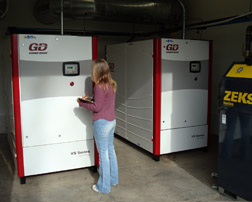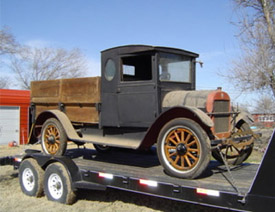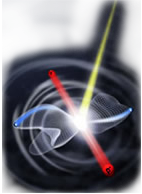
Pre-cleaning is required to prevent contamination of the pre-treatment blast media. It is also required prior to stress-bake to avoid difficulties associated with removal of cross-linked compounds (baked-on grease).
Deep narrow cavities, slots and blind holes contaminated with oil, grease, center-lube, etc. may otherwise trap the blast media and contaminate the coated parts and the coating baths.
The expense of removing heavy preservatives, heavy oil, and globs of center lube, grease and thick paint-pen markings can be avoided.
A blush of rust on incoming parts is not a problem when high quality MnPhos coatings are required. A blush of rust does not require pre-cleaning since the pre-treatment blast operation will remove it easily.
We will quote with the assumption that we will clean your parts prior to coating unless we know you will be performing or eliminating the need for some of the pre cleaning at your facility. Several of our customers have modified their procedures at little or no expense to eliminate the need for pre-cleaning at our facility.
Milspec parts at or above Rc39 are required to be stress baked prior to pre-treatment and coating to prevent surface cracking during the coating process. Milspec parts that have been ground or cold worked or cold straightened are also required to be stress baked for the same reason.
Milspec parts that have been through hardened with areas of case hardening will be subjected to the lower-temperature stress bake procedure (see time and temperature below).
Milspec parts may be excluded from stress bake requirements when drawing A7309999 is specified as the coating specification and the part drawing does not specify that the stress bake must be performed.
Commercial parts, depending on the coating specification, may be excluded from stress bake requirements. We strongly recommend that the intended use of the parts being coated be carefully examined for the possibility of liability if the part were to fail and the lack of hydrogen embrittlement were to be found as the reason for failure.
Commercial parts recognized as weapon system components will be stress baked.
Times and Temperatures
Through hardened parts are baked at 375F for 1-hour for each inch of cross section.
Case hardened parts are baked at 275F for 8-hours to prevent softening of the case. Flame hardened parts are considered case hardened unless otherwise specified on the order.
Procedural Necessity
Some parts require that the stress bake operation take place before final grind to assure that the dimensional requirements remain within tolerance after coating. Note on your order "DO NOT STRESS BAKE" when your heat-treat procedures have incorporated the appropriate minimum stress-bake time and temperature requirements of MIL-DTL-16232G.
MnPhos crystals are planted, nurtured and grown to maturity from nucleation sites we create on the surface of the ferrous parts you manufacture. 99.9% of our coatings are grown from nucleation sites created by pre-treatment blasting to “white” condition.
Pre-treatment blasting is often ordered to significantly increase adhesion of chrome and nickel plating.
Pre-treatment blasting is also used for media profiling jobs. Surface texture to a wide range of customer specifications is controlled for a wide range of textures on stainless steel, brass and aluminum parts when no protective or decorative finish is otherwise required. Reasons for media profiling range from cosmetics to coefficient of friction.
Less than 1/10 of 1% of our MnPhos coatings is applied to surfaces without pre-treatment blasting. Alkaline cleaning, pickling and grain refiners (phoL) provide nucleation sites that are in most cases inferior to blasting pre-treatment. Manufacturing control is essential to growing quality coatings when blast pre-treatment is not used.
Cost Savings Example:
A long-time commercial customer sent us 450 rather expensive milspec navy shafts made from AISI 4140 through hardened to Rc 35, carburized and case hardened to Rc 52 on two diameters. Four diameters were ground to 8-micro with a unilateral tolerance of minus 0.0005. Straightness of the skinny 14" long shafts was 0.002 T.I.R. on all of the ground diameters between centers.
The problem was that the stress-bake was not performed prior to the final grind by the customer and heavy heat treat scale was present on surfaces adjacent to the close tolerance diameters. Stress bake and/or pretreatment would have warped the parts out of tolerance. Abrasive blasting to remove the heat treat scale would have removed too much stock and made the diameters undersize. Glass bead did not cut through the heat treat scale.
The expensive solution (first lot): 1) Request deviation to omit milspec stress bake (approved first lot only), 2) machine sleeves with brass screws to attach and protect the ground diameters to remove the heat treat scale then glass bead blast the entire part to create the nucleation sites to apply the milspec MnPhos coating. Our added cost to coat was about $8.50 per part.
The inexpensive solution (8 subsequent lots): 1) abrasive blast to remove the heat treat scale prior to final grind by the customer (later changed to vacuum heat treatment to eliminate the heat treat scale all together) and 2) perform the pre-phos coat stress bake immediately prior to final grind. There was no added cost to coat. In fact we gave the customer a $0.65 price reduction per part because he provided certification that the pre-coat stress bake was already performed, the heavy heat-treat scale was gone, and Triple E saved time.

A large number of enthusiasts and body shops use or facilities to have their customer’s vehicular frames and other car parts blasted for painting. Sandblasting is about half of the price of pre-treatment blasting. Some customers choose perfection and specify pre-treatment blasting quality (abr1) over sand blasting (abr2).

